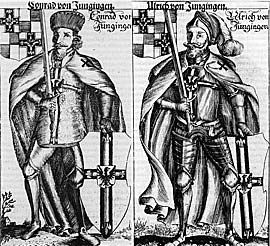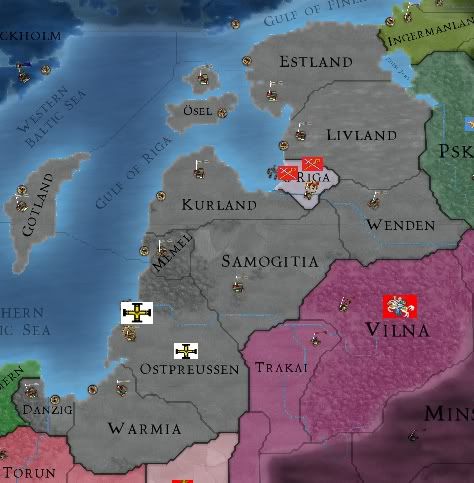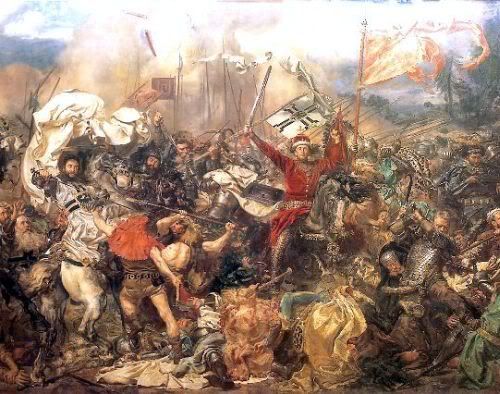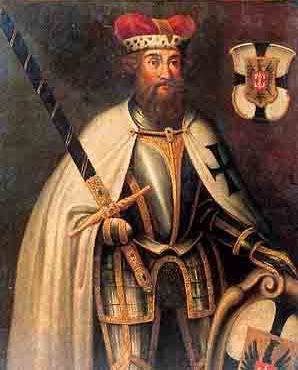The Iron Cross Triumphant
Albrecht I "the Glorious" Jan 1416 – Apr 1440
The Conclusion of Walter’s War
The prolonged passing of Walter I gave the Generalkapitel time to convene to discuss his replacement. With Walter’s blessing, they settled on Albrecht von Darmstadt, the Großkomtur of the Ordenstadt. Albrecht was an administrative genius who was responsible for the swift integration of Stade in 1412 as a core territory of the Ordenstadt. The results of his efforts impressed Walter I, who granted him more responsibility, and by the time of his appointment of Hochmeister he was already administering the lands of the Ordenstadt as the Großkomtur of the order while Walter fought his wars. When Walter passed away, he was immediately appointed Hochmeister and assumed his new duties the day after Walter’s death.
Albrecht’s administrative genius would be exactly what the growing Ordenstadt required. Historical accounts depict him as a cold and extremely practical man, a problem-solver who ruthlessly sought to strengthen the Order’s internal organization and assimilation of conquered German lands. Unlike Walter, Albrecht preferred to control matters of state from the shadows rather than deal with them personally. Recognizing his own inadequacies at warfare and diplomacy, Albrecht made full use of the blossoming military minds in the Order, and exploited the unique diplomatic channels available as a (admittedly distended) arm of the church to improve relations with the rest of Europe and the Papacy.
As the subjugation of Oldenburg was still proceeding, Albrecht’s first action was to bring the war to a successful conclusion. He immediately appointed the talented commander Martin von Hoyningen, to lead the Order’s main army against the last remaining enemy forces. In three months, Martin had cleared out the last remaining enemy armies, and was besieging all of the enemy lands. By January 1417 the German coalition was broken, and Albrecht dictated harsh terms. Oldenburg was vassalized, as were the most powerful nations of the coalition Thüringen and Brunswick. The addition of these vassals simultaneously shattered the remains of the “North Gerrman coalition” which had opposed the Ordenstadt, increased its economic and military strength, and made it the clear dominant power in Northern Germany.
Against the Emperor
Following the successful war, Albrecht focused on re-organizing the Order’s military forces using the experience his troops and commanders had gained in Germany. At the recommendation of his generals, he focused on reforming the Order’s much neglected infantry by supplying each man with a short spear, sword, shield, helmet, and mail hauberk, in the style of the French and English men at arms. Furthermore, he instituted a strict military training regimen which focused on drilling all troops in basic combat, formation fighting, and quick response to orders. Based on the events of past campaigns, Albrecht and his generals concluded that the most effective siege force was a small unit of 2,000 infantry with an additional 1,000 cavalry for rapid response. Noting that a 2:1 infantry to cavalry ration also made for an effective army composition, Albrecht organized the Order’s armies into cohorts of 2,000 infantry and 1,000 cavalry under a single commander. At the beginning of a campaign, several (typically four or five) cohorts would be combined into an army, but once large-scale resistance was quelled the army would advance into enemy territory, leaving cohorts behind to subjugate any remaining resistance. This organizational paradigm would prove to be extremely effective, as a general could split up and reform large armies dynamically without having to worry about army composition. On the battlefield, the increased delegation to the cohort commanders gave the Order’s armies excellent flexibility and responsiveness when compared to the previous model. Until the introduction of cannon in the late 15th century, the cohort would remain the basis of all Teutonic armies.
With well trained, well equipped veteran armies, Albrecht was confident enough to confront the Emperor once again by March of 1418, barely a year after the previous war had ended. The Emperor had recently sustained massive casualties in a war with Poland and Lithuania ending in 1415, and was temporarily weakened. However, the Order’s attacks on other Catholic nations were raising concerns in the European courts. Despite the fact that the Ordenstadt had legitimate casus belli’s for all of its wars, the sight of a crusading state warring on Catholics was unsightly. Fortunately, events in Bohemia would present Albrecht with a golden opportunity to legitimately expand the Ordenstadt.
The Hussite heretics followed the teachings of a certain Jan Huss, who rejected several key teachings of Catholicism, in particular all sacraments except baptism and communion. After Huss’ execution at the Council of Constance in 1415, the Hussites grew larger and more restless expelling Catholic priests and monks from several areas in Bohemia. Many factions of the Hussites felt particular hated for the monastic orders and the Teutonic Order in particular. Viewing a popular movement which disliked the upstart Ordenstadt, as an asset, the Bohemian Emperor Vaclav IV against the wishes of the Pope granted the Hussites religious toleration. This pattern of events was repeated in the duchy of Pomerania, and old adversary of the Order, giving Albrecht the perfect excuse to attack. Claiming that the Duke of Pomerania was colluding with heretics against the church and the Ordenstadt, he declared war in early 1418.
Pomerania was defended by a coalition lead by the Bohemian emperor joined by Cologne, Meinster, Lauenburg, and Pskov. The Order was joined by her vassals and Brandenburg, but once again the Austrian Archduke refused to join the war. When word of this betrayal reached Albrecht, he fell into an uncharacteristic fit of rage, and insulted the Archduke calling him a craven, dishonorable coward and swearing that the Order would never again ally with such a worthless nation. Needless to say, relations with Austria suffered greatly. It is uncertain why the Austrians failed to join the Order, for if they had the Bohemians would have been hopelessly outnumbered. Some historians suggest that the Austrians were becoming wary of the rapidly expanding Ordenstadt, and wished to see it defeated, while others suggest that since the Bohemian emperor was elderly, the Archduke did not want to harm his chances of becoming Emperor in the event of his death. Whatever the cause, the Austrian desertion left both sides evenly matched numerically, but Albrecht’s reforms to the army as well as superior Teutonic leadership would soon give the Order the upper hand.
Hostilities commenced with a major battle in Niederlausitz; Konrad von Ruszdorf, with a 12,000 man army attacked the Bohemian Emperor Vaclav with 15,000 men. Von Rusdorf was one of the brightest generals appointed by Albrecht, and made full use of his superior troops and organization to swiftly defeat the Emperor losing only 3,000 men to the emperor’s 4,500. Eager to finish of the main Bohemian army, he pursued the emperor to Breslau and utterly crushed the demoralized Bohemians. Vaclav, watching the destruction of his armies from a hill, became mad with rage which caused a massive heart attack. Within two months, Bohemia’s main army was destroyed, and the emperor himself was dead.
Meanwhile, Martin von Hoyingen led the second Teutonic army of 12,000 men against the 6,000 man Pomeranian army that was besieging Berlin. The flat terrain coupled with superior training and leadership lead to another massive Teutonic victory; the entire Pomeranian army was wiped out for the loss of only 700 men. The few minor enemy forces remaining were hunted down and destroyed, as was a minor invasion from Pskov. Still feeble from the failed invasion of Poland, Bohemia was unable to offer any resistance, and the Ordenstadt’s cohorts settled into the long sieges of the Bohemian and Pomeranian cities.
With the death of the emperor, the Imperial Diet convened to elect his successor. The three candidates were the nations of Burgandy, Austria, and Bohemia. Burgandy was only a minor competitor, as their aggressive actions against the minor nations in the Netherlands soured relations between them and the Diet. Austria was in a good position to counter the increasingly powerful Ottoman Turks, but the electors in Northern Germany flat out refused an emperor who had been allied with the Teutonic Order not so long ago. With no other options, the imperial crown was given to Vladislav III, the son of Vaclav IV. Vladislav III was a king without a kingdom though. Until the end of the war, he stayed in the Austrian capitol, of Vienne and bitterly watched his realm’s humiliation.
The long sieges began to end, one by one, and by the middle of 1419 Albrecht sent out diplomats to his foes with harsh terms. Pomerania, Lauenburg, and Pskov were forced to swear fealty to the Order. Bohemia was forced to release the nation of Silesia and pay a large sum of gold. Albrecht cunningly ignored the issue of the Hussites, realizing that it would give him a perfect excuse for future wars against the Emperor. The war was over, and the Empire had been decisively humiliated.
Gameplay Notes:
- I got Gov 4 and Mil 5, giving me Men at Arms. I chose Military Drill as it would be essential to my future expansion
- For this part of the game, I had a gov tech, diplomat, and Mil. tech advisors.
- Infamy spiked to about 15 at this time, and as Albrecht had a Dip 3 it would take a lot of time to burn
- The Ottomans have fought several wars against Castille, the Italians, and Hungary and won them all
Temporal Power
With its defeat by the Teutonic Order, the Emperor began to lose all respect and authority. The Emperor had failed to protect the Spanish, Italian, and Magyar states from the ravages of the Ottoman Turk. Furthermore, the Emperor lost credibility and respect with its unjustified and failed invasion of Poland and the toleration of the Hussite heretics. The member states of the empire began to doubt in the protection of the Empire, and many of the smaller states in the western half of the empire banded together with mutual alliances and guarantees to defend against foreign invasion. Outside the Empire, powerful nations such as France, England, and Castile started to think of the Empire as a joke. As the Order expanded its influence into the Imperial territories, it began to assume the role of the Emperor in defending the German lands from foreign incursion.
Meanwhile, Albrecht began implementing some important reforms to the structure of the Teutonic Knights that would have consequences for years to come. Albrecht recognized the value of propaganda both in assimilating conquered lands, and in legitimizing his conquests in the eyes of others. Working off of his experiences in Stade, he ordered the members of the Order not under arms to preach against the Holy Roman Empire and for the creation of a German state under the Order. Furthermore, all priests who taught at the churches and schools inside the Order’s lands were carefully vetted for anti-Teutonic ideals and were strongly encouraged to teach and preach thought favorable to the Order’s plans. This effectively transformed the idle and foreign chapters of the Order into an extensive espionage and propaganda network which actively promoted his conquests inside and outside the Ordenstadt. It would take years of effort, but by using the power of the pulpit to spread his propaganda Albrecht slowly began to legitimize the Order’s rule and influence in Germany.
On the diplomatic front, Albrecht sent out many diplomats with reassuring words and gifts, particularly to the papacy and the republic of Novgorod. His efforts were rewarded when Novgorod signed an alliance with the Order thus protecting their flanks from Scandinavian or Lithuanian aggression. Inside the Curia, his efforts saw the appointment of two Teutonic cardinals, insuring that the Order would have a say in papal policy. Another important event was the annexation of Magdeburg. The young duke Leopold Wilhelm was persuaded by a good friend to take up the black cross, and in doing so he ceded his lands to the Ordenstadt.
Gameplay Notes:
- I tried to maintain good relations with Castile, France, and England through mil. access treaties. Relations were around 50 for all of them
- I gifted that Papal States up to 200 relations. In this period I typically had 1-2 cardinals (they die off awfully fast, don’t they?)
- Mission “Annex Magdeburg” for a core

War in Scandinavia
Along with Magdeburg, Albrecht inherited its boundary disputes with neighboring Luneburg. Arguing that annexation was necessary to connect Magdeburg with the rest of the Order, Albrecht declared war in November of 1420. Luneburg was guaranteed by Denmark, and the shaky Kalmar union temporarily put aside their differences to combat the Order. Still reeling from their earlier defeat, the Emperor refused to com to Luneburg’s aid. The Order was aided by their vassals, Brandenburg, and Novgorod (eager for a piece of Sweden) giving them a distinct advantage on land and sea. However, Albrecht, fearful of the harsh Scandinavian weather, refused to invade such a desolate land for little gain.
On the mainland, the tiny army of Luneburg was no match for the Order, and a cohort immediately destroyed their small army and began the siege. Military access through Holstein was secured, and the Order sent an army into the Danish peninsula. In the East, the main Swedish army began the long trek to the Novgorodian border, only to be defeated. At sea, the navies of the Order and the Hansa proved superior in number and quality to the Scandinavian navies and quickly established naval supremacy. Noting the usefulness of the navy in defending against the Scandinavians, Albrecht commissioned four new carracks at Konigsberg for future wars.
Half a year in, the Order’s armies were still mostly intact, and the Danish army was trapped on their island capitol of Sjælland by the Teutonic fleet. Hoping for a decisive victory, Albrecht personally lead an army of 10,000 men against the 7,000 man Danish army lead by king Eric VII Gryf, and achieved a crushing victory against the Norse king. With a 10:1 advantage in men, Albrecht stormed the Danish capitol, and imprisoned Eric VII in his own castle for half a year until the siege of Luneburg concluded. By November 1421, just one year after the start of the war, Albrecht had achieved his goals. As his reputation was still poor from his conquests in Germany, Albrecth’s terms were relatively mild. Lauenburg was annexed by the Order, while Denmark was required only to recognize Teutonic dominance over Germany and the Baltic. Another effect of the Teutonic victory over the Kalmar Union was that it allowed England to take back its territories without fear of Norse interference. Within a few years, England had reclaimed all territories south of Scotland and was once more the dominant power in the Atlantic.
Gameplay Notes:
- I kept getting “Subjugate X” and “Conquer X” for all the minor nations in Germany which gave me a lot of cores. Over half of my conquests and annexations immediately became core territories
- The Kalmar Union fell apart shortly after this war.
Defender of the Weak
Albrecht’s commitment to defend his smaller neighbors was tested when the Polish king August II Jagiellon invaded the small country of Mazovia in the summer of 1422. Poland had become increasing feeble since the severing of the Polish-Lithuanian union, and August II decided that he must annex his weaker neighbors to remain strong against the threatening Lithuanians, Hordes, Bohemians, and Teutons. Mecklenburg and Moldovia joined Poland in her war, but were outclassed by the Teutonic coalition in numbers, equipment, and doctrine. Eager to expand into the neighboring Polish lands, Albrecht sent Konrad von Ruszdorf with 12,000 men into Poland. However, August II evaded him by marching through Lithuania to besiege the capitol of Konigsberg. With the Poles at the gates, Albrecht gave command of the Teutonic reserve army of 13,000 men to the young Dietrich Freytag von Loringhoven, who crushed the Poles and obliterated their army.
The Polish armies had been destroyed, and their allies were quickly swarmed by the Order’s vassals. A mere five months after the war began most of Poland had been occupied by Albrecht’s cohorts. His expansionist dreams in ruins, August II was forced to cede the provinces of Poznan, Kalisz, and Plock to the Ordenstadt in return for peace. Albrecht’s eventual goal was to connect the Prussian heartland of the Order with its newly acquired German territories, and the foolish aggression of the Polish king advanced his designs immeasurably.
Barely half a year later in September 1422, the Bohemian Emperor Vladislav III without provocation invaded the nation of Hungary, which had just endured a disastrous defeat by the Ottoman Turks. The Catholic rulers of Europe were outraged that a man who had sworn to defend against the infidel would opportunistically invade another Catholic country that was weak from fighting the infidel, and the Order gained much appreciation when it honored its guarantee of Hungary and declared war on the Emperor. All of the Order’s vassals and allies (including the powerful nations of Brandenburg and Novgorod) joined the war. Diplomatically isolated and still weak from the earlier war with the Order, the Emperor was in no position to defend against the mighty coalition. Albrecht lead an army into Bohemia and gained much fame by destroying a Bohemian army twice as large as his at the Imperial capital of Bohemia. Six months later all of Bohemia was occupied and the Emperor was forced to withdraw his claims on Silesia, end his foreign treaties, and pay a large sum of gold for peace. This time, Europe applauded the Order as it humiliated the Emperor a second time.
Albrecht’s defense of Mazovia and Hungary gained the Order much prestige and appreciation. The nation of Mazovia was particularly appreciative and eventually became one of the Order’s most trusted (but not largest) allies. Vladislav’s ill considered invasion of Hungary, tolerance of the Hussites, and refusal to lift a finger against the dreadful Ottomans (or the Order) made the emperor deeply unpopular. This unpopularity combined with Bohemia’s military weakness and a growing acknowledgement of Teutonic Hegemony over North Germany resulted in only minor protests when Albrecht invaded and swiftly annexed the tiny nation of Lauenburg.
Gameplay Notes:
- Poland-Lithuania has completely fallen apart now. Lithuania has massive unrest and collapses into the Ukraine… which later collapses into Lithuania. Eventually a smaller Ukraine and Lithuania emerge.
- The OE has won a LOT of wars against the Italians and Spanish. Byzantium was conquered by Venice before they could get to them though
- I have a high WE and infamy right now (~18) manpower is still OK, the max is about 25,000
1425: A Quick Overview of the Order
Twenty-five years had passed since the council of 1399, and the Order’s size, power, wealth, and prestige had all increased dramatically. The provinces of Riga, Stade, Bremen, Altmark, Luneburg, Anhalt, Poznan, Kalisz, Plock, and Lauenburg had been added to the Ordenstadt, while the Hansa, Meinster, Brunswick, Thüringen, and Pskov all swore fealty to the Order. Diplomatically the Order was allied with Silesia, Brandenburg, Novgorod and Mazovia, and generally had good relations with the European powers outside of Germany. The Order boasted an army of about 27,000 men (nine cohorts), a large navy of roughly 20 carracks and 14 cogs, and some of the best generals in the world. Financially the Order was one of the richest nations of the world; on par with giants such as France or Castile. However, the Order was still technologically backwards when compared to the rest of Europe, but a strong focus on land and government technology kept the Order’s armies competitive. The Ordenstadt had become one of the “great powers” of Europe.
The Gathering Storm
A portrait of Albrecht I commissioned during the quiet year of 1426
Germany was quiet for several years following the war with Bohemia. The Order’s people were weary from years of near constant war, and Albrecht wanted time to give his diplomats time to repair the Ordenstadt’s reputation abroad and to suppress the rebellious provinces he had conquered from the Poles. The next few years were peaceful for the Order, and in this period of rest the Duke of Brunswick was peaceably convinced to join the Order and allow his nation to be annexed. Years passed, but Albrecht’s ambitions only grew as he saw the power of his realm. By December 1427 Albrecht felt that the Order was ready for war.
What followed would be remembered as one of the greatest diplomatic blunders in the Order’s history. Albrecht demanded the vassalization of the small nation of Munster, and declared war when the duke refused. Unfortunately Munster was guaranteed by Brandenburg who, realizing that they were in the path of future Teutonic expansion, sided with Munster. Bohemia, eager for a re-match declared war on the Order, and through a recent alliance with the Hapsburgs brought in the mighty Austrians as well. The final straw was when Novgorod dishonored their alliance with the Order, leaving Albrecht alone against two of the greatest powers in the empire.
Author’s Note:
Dang Albrecht is LONG! I’ll be moving over the weekend so don’t expect much for a few days… but when I return I’ll have the epic showdown with the Austrian alliance!!!





